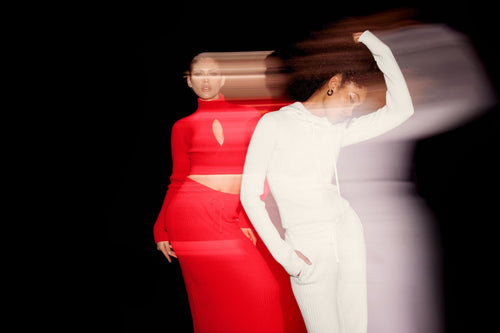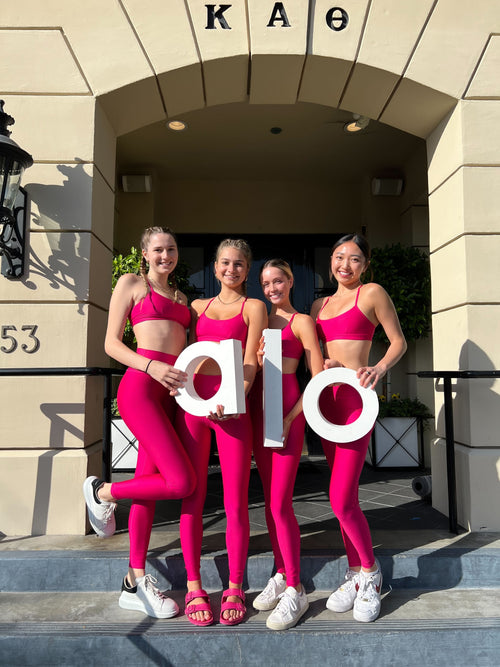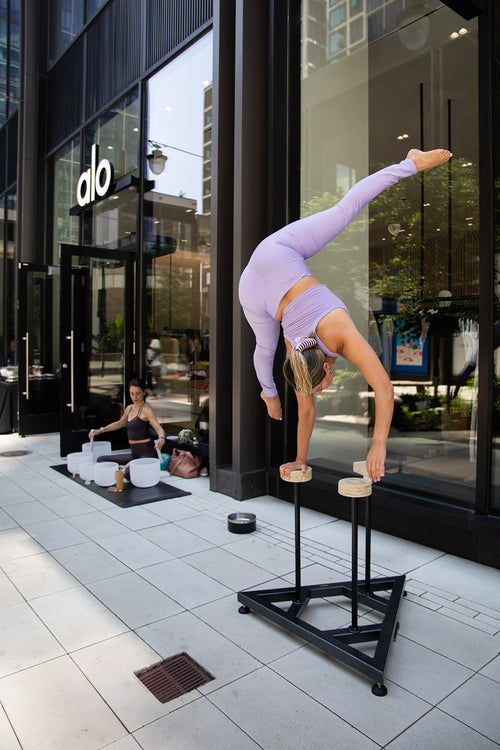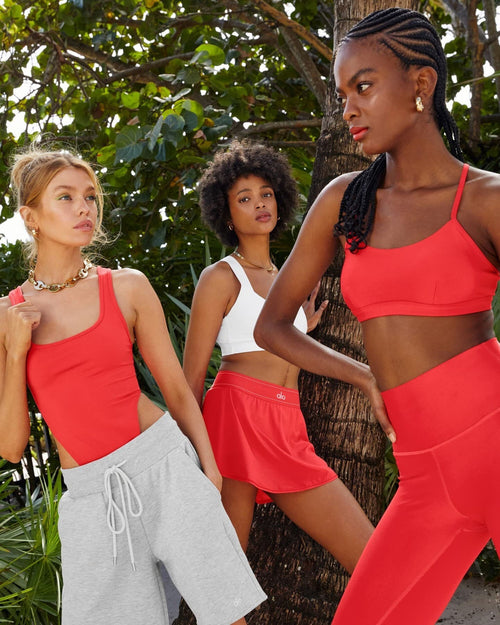Big news: Alo is joining Ellen and Hillary (yes, that Hillary) to support Girls Build LA, an initiative born out of the nonprofit organization LA Promise Fund that gives girls in L.A. public schools the opportunity to effect social change. The super-inspiring organization is holding their first-ever leadership summit this Friday, a gathering of 10,000 girls for a day of impactful conversation and female empowerment. As a strong supporter of the Girls Build LA mission and commitment to develop future women leaders, we're donating 10,000 T-shirts to the summit to support the cause and help inspire these girls who are so eager to make a difference in their communities. Held at the L.A. Convention Center, the event will feature talks from Hillary Clinton, California Senator Kamala Harris (we are obsessed with her, btw) and other incredible trailblazers. Plus, three teams from the Girls Build Challenge, a program designed to help girls solve an issue in their community, will present their final projects. Get ready for some serious girl power.
To get a closer look at how Girls Build LA helps girls enact positive change, we talked to the team from Compton Early College High School and their teacher Kimberly Ponce about how they're getting involved in their community. For their third year participating in the Girls Build LA Challenge, the girls, designated "Change Agents," are focusing on promoting leadership among their peers and eventually hope to create a Youth Advocacy Group within Compton's mayor's office to voice challenges that girls like them face.
How long have you been a part of Girls Build LA, and what made you want to get involved?
Mireya Vivar: I’m a junior, and I’ve been a part of Girls Build LA for two years now. I joined because I wanted to help other girls reach their full potential, and I wanted to help my community.
Luz Mendez: I joined Girls Build LA my freshman year, when my social studies teacher Ms. Ponce informed us that Girls Build LA was an organization that would help us develop into agents of change within our community. I resonated with that, and that’s when I realized that Girls Build LA would help me be the change that I want to see in the world.
Torraynce Williams: I’ve been in Girls Build LA for two years—I started my freshman year. At first, coming to high school, I was antisocial because I was scared of being one of the youngest kids at school, but being in Girls Build LA has helped me open up to girls my age.

As part of the Girls Build Challenge, you’re focusing on civic engagement and hoping to create a Youth Advocacy Group for the city of Compton. Why are these goals so important to you and your team?
Luz: We decided on this project because there’s only one student representative [in Compton] who speaks for over 5,000 high school students, so we decided to give the youth a voice.
What are the issues in your community that you’d like to create a dialogue around?
Mireya: Personally, I think there are some environmental problems that we have around Compton, such as the [carcinogenic chemical] chromium 6, which has been prevalent in our city and is detrimental to the lives of citizens.
Luz: To go along with that, we have reached out to Congresswoman Nanette Diaz Barragán to discuss the carcinogens and the air quality in Compton. Last year, we focused on health and wellness and educating students on the different ways to relieve stress and lead healthier lives, but this year we decided it was best that we shift our focus to civic engagement and leadership because of the carcinogens that we are taking in every day. We realized that it was time to do something about it.

What have you learned from being a part of Girls Build LA?
Yesenia Enciso: I have learned lots of things, like how to communicate with others, and I’ve gained self-confidence.
Torraynce: I have learned how to interact with people outside of my culture. I am African American, and Compton [is made up of] mostly Hispanics and African Americans. Since we’ve gotten to attend conventions, I’ve had the chance to interact with people outside of [these communities]. I also learned that you should never change yourself for somebody, and that you should know your worth.
How has GBLA empowered you in your everyday life?
Emily Sanchez: I’m friendlier towards girls because I think we should support each other. It’s led me to create new passions for myself and get more involved in my community.
Kimberly Ponce: I also feel like Emily has taken on a leadership role. She's responsible for emailing our Congresswoman, and she organized a meeting with her. She also emailed our mayor and, as a result, we now have a meeting set up with the mayor’s office.
What are your personal goals for the future?
Torraynce: I want to be a better person, physically and emotionally, and I want to inspire people. Also, I want to become an FBI agent. Overall, I just want to be an honest person because I feel like lying has taken over the world, and that’s the reason why we’re where we are today. I feel like if I’m a more honest person, I can make a change in the world.

Nelly: I want to be a lawyer. Throughout my community, I’ve seen people struggle with the laws because they don't understand them. Helping people is my passion, and if I'm able to do that in the future, that would make me the happiest person alive.
Emily: I haven’t really decided what I want to do when I grow up, but Girls Build LA has led me to [seek] a career choice that will positively impact people’s lives. Some options that I’ve considered are being a lawyer, going into the medical field or becoming a politician—like the Senator, or even the President—so I can directly effect the change that I want to see in my community.
Mireya: Some personal goals that I have for the future are finding a substitute for plastic and establishing more recycling bins in our city. I also want to become a better person and try to see the good in other people.
Luz: I feel like every little girl dreams of being a lawyer, a doctor, an actress—there are so many paths that have sparked my interest, but being a part of Girls Build LA has [narrowed] these interests into a much simpler one. I would like to go into psychology or political science, or maybe both. Women currently make up more than half the population in the U.S., but they are represented by a Congress made up of 80% men. That’s why I would like to go into political science and become a female representative.

Who’s your biggest role model?
Torraynce: Single mothers. It’s hard raising a child by yourself—sometimes things don’t go as you planned, and you still have bills to pay. I have a lot of respect for them because, at the end of the day, they want to see their child become something big in the world.
Yesenia: My biggest role model would have to be my aunt. She was basically my second mom because she would motivate me to strive for more in school. She’s my biggest inspiration in life because she has achieved a lot of her goals.
Emily: My role model is Kamala Harris; she inspired my career choice to go into politics. She listens to the people and directly effects the change that’s going to benefit our community.
Luz: My role model is Malala Yousafzai because she advocates for female education, and she’s basically on a mission to meet girls and listen to their stories. Everywhere she has gone, she’s heard directly from girls about barriers to education, such as violence, poverty, health and the machismo culture. Malala has brought her message directly to the world leaders, and she has held over a dozen meetings with presidents and prime ministers, urging them to invest in girls’ education.
Be sure to follow us on Instagram to see highlights from the summit, and stay tuned for more on the blog!








